Comprehensive Guide to Garden Maintenance in Chislehurst

Maintaining a beautiful garden in Chislehurst requires dedication, knowledge, and the right strategies. Whether you’re a seasoned gardener or a novice, understanding the specific needs of your garden can make a significant difference. In this article, we’ll explore essential tips and techniques to keep your garden thriving throughout the year.
Understanding the Local Climate is crucial for effective garden maintenance. Chislehurst experiences a temperate climate with mild summers and cool winters, which influences the types of plants that will flourish in your garden. Selecting native plants or those well-suited to the local conditions can reduce maintenance efforts and enhance the health of your garden.
Another key aspect is soil quality. Testing your soil to determine its pH level and nutrient content can help you make informed decisions about fertilizing and amending the soil. Healthy soil is the foundation of a vibrant garden, supporting strong root systems and robust plant growth.
Seasonal Garden Maintenance
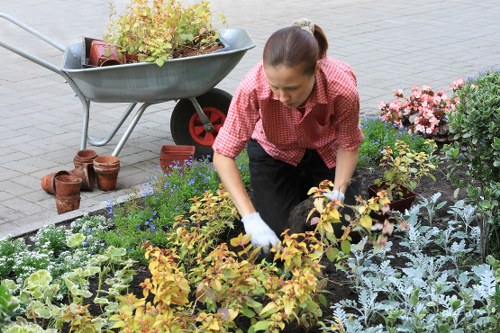
Different seasons bring different challenges and opportunities for your garden. Tailoring your maintenance tasks to each season ensures your garden remains in top condition all year round.
Spring
Spring is the perfect time for planting new flowers and shrubs. It’s also when you should start preparing your garden beds by removing any debris from the winter and adding fresh compost to enrich the soil.
Don’t forget to prune your trees and shrubs in early spring to encourage healthy growth. This also helps in maintaining a well-structured garden layout.
Summer
During the summer months, the focus shifts to watering and weeding. Consistent watering is essential, especially during dry spells. Using a drip irrigation system can help conserve water while ensuring your plants receive adequate moisture.
Regular weeding prevents unwanted plants from competing with your garden’s flora, keeping your garden neat and healthy.
Autumn
Autumn is the time to prepare your garden for the colder months. This includes clearing fallen leaves, which can otherwise smother plants and inhibit growth. It’s also an ideal time to plant bulbs that will bloom in the spring.
Additionally, autumn is perfect for soil testing again to add necessary nutrients before winter sets in, ensuring your garden is ready for the next growing season.
Winter
Winter maintenance involves protecting your plants from frost and harsh weather. Mulching around the base of plants can help insulate the soil and retain moisture.
It’s also a good time to plan and design any changes you’d like to make to your garden in the coming year, setting the stage for a successful spring.
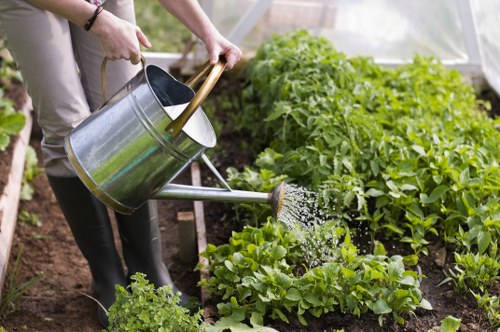
Essential Garden Tools and Equipment
Having the right tools is essential for efficient garden maintenance. Investing in quality equipment can save you time and reduce physical strain.
- Pruners and Shears: Essential for trimming and shaping plants.
- Watering Systems: Drip irrigation or soaker hoses ensure efficient watering.
- Soil Test Kits: Helpful for monitoring soil health and nutrient levels.
- Gardening Gloves: Protect your hands from thorns and rough surfaces.
- Wheelbarrows: Useful for transporting soil, plants, and tools around the garden.
Maintaining your tools by cleaning and storing them properly extends their lifespan and ensures they function effectively when you need them.
Regular maintenance of your garden tools is just as important as maintaining the garden itself. Sharpening blades and oiling moving parts can prevent rust and make your tools easier to use.
Advanced Tools for Professional Maintenance
For those looking to take their garden maintenance to the next level, investing in advanced tools like Lawn Aerators and Rototillers can enhance soil health and plant growth. These tools help in breaking up compacted soil, allowing better air and water penetration.
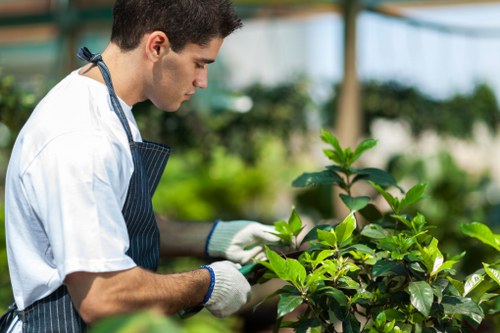
Plant Selection and Care
Choosing the right plants is fundamental to successful garden maintenance. In Chislehurst, it's important to select species that thrive in the local climate and soil conditions.
Consider incorporating a mix of perennials and annuals to ensure year-round interest. Perennials provide structure and longevity, while annuals add bursts of color throughout the growing season.
- Shade-Loving Plants: Ideal for areas with limited sunlight.
- Sun-Loving Plants: Perfect for spaces that receive ample sunlight.
- Drought-Tolerant Plants: Great for reducing water usage during dry periods.
- Fragrant Plants: Enhance the sensory experience of your garden.
Regularly pruning and deadheading plants encourages healthy growth and prolongs blooming periods. Removing spent flowers also prevents pests and diseases from taking hold.
Mulching for Healthy Plants
Mulching is a simple yet effective practice that benefits your garden in multiple ways. It helps in retaining soil moisture, suppressing weeds, and regulating soil temperature.
Organic mulches, such as bark or compost, also enrich the soil as they decompose, providing essential nutrients to your plants.
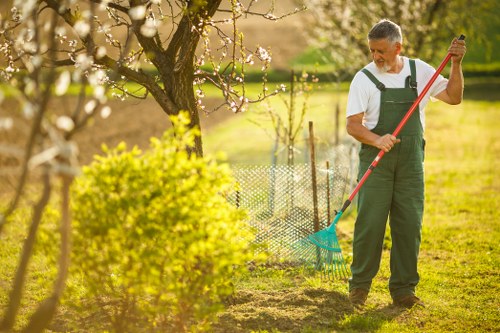
Pest and Disease Management
Maintaining a healthy garden involves proactive measures against pests and diseases. Regular inspection of plants can help in early detection and treatment.
Implementing integrated pest management (IPM) strategies minimizes the need for chemical interventions. This includes encouraging beneficial insects, using natural repellents, and maintaining plant diversity.
- Biological Control: Introducing predators like ladybugs to control aphid populations.
- Mechanical Control: Using barriers or traps to catch or exclude pests.
- Cultural Control: Adjusting planting times or practices to reduce pest attraction.
For disease management, proper spacing of plants ensures good air circulation, reducing the likelihood of fungal infections. Removing and disposing of affected plant parts prevents the spread of diseases.
Organic vs. Chemical Treatments
Whenever possible, opt for organic treatments to maintain a healthy and sustainable garden. Organic fertilizers and pesticides are less harmful to the environment and beneficial organisms, promoting long-term garden health.
Lawn Care in Chislehurst
A well-maintained lawn is a pivotal feature of any garden. Proper lawn care enhances the overall appearance and provides a lush green space for relaxation and recreation.
Mowing Techniques play a critical role in lawn health. Regular mowing at the appropriate height ensures that the grass remains thick and resilient against weeds and drought.
- Height: Adjust your mower to cut grass at about 2.5 to 3 inches high.
- Frequency: Mow your lawn once a week during the growing season.
- Sharp Blades: Ensure mower blades are sharp to make clean cuts, reducing stress on the grass.
In addition to mowing, fertilizing your lawn during the spring and autumn provides essential nutrients, promoting healthy growth and vibrant color.
Weed Control Strategies
Weeds can quickly overtake a lawn, competing with the grass for nutrients and water. Implementing effective weed control strategies is essential for maintaining a pristine lawn.
Manual removal, mulching, and the use of pre-emergent herbicides are effective methods for managing weed growth. It's important to address weeds promptly to prevent them from establishing deep root systems.
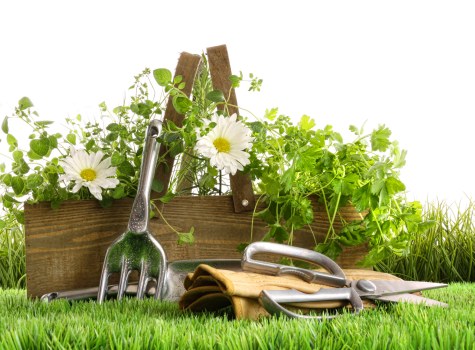
Hardscaping and Garden Structures
Incorporating hardscaping elements such as paths, patios, and fences can enhance the functionality and aesthetic appeal of your garden. These structures provide structure and can define different areas within your outdoor space.
Paths and Walkways guide visitors through your garden, making it easier to navigate and enjoy different sections. Materials like gravel, stone, or concrete offer durability and style.
- Patios: Create a comfortable outdoor living area for entertaining and relaxation.
- Fences and Walls: Provide privacy, security, and a sense of enclosure.
- Garden Edging: Define planting beds and prevent the spread of grass and weeds.
Proper planning and installation of hardscaping elements contribute to the long-term maintenance and enjoyment of your garden.
Water Features
Adding water features like fountains, ponds, or birdbaths can add a tranquil element to your garden. They not only enhance the visual appeal but also attract wildlife, contributing to a vibrant ecosystem.
Maintenance of water features involves regular cleaning, balancing water chemistry, and ensuring that pumps and filters are functioning properly to prevent algae growth and stagnation.
Professional Garden Maintenance Services
While DIY garden maintenance is rewarding, there are times when professional expertise can make a significant difference. Garden maintenance services in Chislehurst offer comprehensive solutions tailored to your specific needs.
Professional gardeners bring experience and knowledge, ensuring that your garden receives the best care possible. They can handle tasks such as pruning, planting, lawn care, pest management, and more.
- Customized Maintenance Plans: Services are tailored to the unique requirements of your garden.
- Expert Advice: Professional gardeners can provide valuable insights on plant selection and garden design.
- Time-Saving: Outsourcing maintenance frees up your time to enjoy your garden without the hassle of upkeep.
Investing in professional garden maintenance ensures that your garden remains healthy, beautiful, and enjoyable throughout the year.
Choosing the Right Service Provider
When selecting a garden maintenance service in Chislehurst, consider factors such as experience, range of services offered, customer reviews, and pricing. A reputable provider will understand the local climate and plant varieties, ensuring effective and sustainable garden care.
Don’t hesitate to ask for quotes and consult with different service providers to find the best fit for your needs and budget.
Sustainable Garden Practices
Adopting sustainable practices in garden maintenance not only benefits the environment but also enhances the resilience and beauty of your garden.
Composting is an excellent way to recycle organic waste and enrich your garden soil. By creating your own compost, you reduce landfill waste and provide your plants with a natural fertilizer.
- Water Conservation: Implementing rainwater harvesting and using drought-resistant plants can significantly reduce water usage.
- Biodiversity: Planting a diverse range of species supports a healthy ecosystem, attracting beneficial insects and pollinators.
- Organic Gardening: Avoiding synthetic chemicals preserves soil health and protects wildlife.
Incorporating these sustainable practices contributes to a thriving garden ecosystem, ensuring long-term growth and beauty.
Energy-Efficient Lighting
Using energy-efficient lighting solutions, such as LED lights or solar-powered fixtures, can enhance your garden’s ambiance while reducing energy consumption. Proper lighting not only highlights key features but also extends the usability of your garden into the evening hours.
Strategically placed lights can emphasize pathways, water features, and special plantings, creating a magical atmosphere after dark.
Conclusion
Effective garden maintenance in Chislehurst involves a combination of understanding local conditions, selecting appropriate plants, employing the right tools, and adopting sustainable practices. Whether you choose to maintain your garden yourself or enlist professional services, the key is consistent care and attention.
A well-maintained garden not only enhances the beauty of your property but also provides a serene space for relaxation and enjoyment. By following the tips and strategies outlined in this guide, you can achieve a thriving and picturesque garden all year round.
Ready to transform your garden? Contact us today to book your professional garden maintenance service and enjoy a beautiful garden in Chislehurst!
